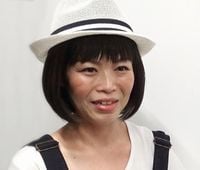In a poignant revelation, comedian Dahihikaru, aged 49, took to his blog on April 25, 2025, to share the distressing news of his cancer recurrence. Titled "Kuyashii yo naa..." which translates to "I'm so frustrated...", Dahihikaru opened up about his long battle with breast cancer, first diagnosed when he was around 40 years old. He reflected on the initial prognosis, stating, "I was told I needed 10 years of treatment, and I thought that was a long time..." This candid admission resonates with many who have faced similar health challenges.
Dahihikaru's journey has been fraught with difficulty, as he explained, "Since I'm turning 50 this year, I might have been told that I'm in remission, but... since it has locally recurred, I will still be going to the hospital for a while." His words capture the mix of hope and despair that often accompanies chronic illness, particularly when faced with setbacks after significant treatment.
Expressing his feelings of regret, he added, "I underwent so much treatment, but I'm sad about the recurrence." This sentiment underscores the emotional toll that such health battles can take, not just physically but also mentally. Dahihikaru's vulnerability in sharing these thoughts is a reminder of the struggles many endure in silence.
In another entertainment-related story, rising stars Nagano Mei and Tanaka Miku have found themselves at the center of media attention following reports of their close relationship. Speculation intensified after they were spotted together at a bar in Tokyo, enjoying a night of tequila and laughter. Witnesses described their interaction as friendly, with some noting the "too close for comfort" distance between them. This has sparked a flurry of discussions among fans and in the entertainment community.
However, the coverage of their relationship has not been without controversy. Many have noted the stark contrast in media treatment compared to other celebrity scandals. For instance, while Nagano and Tanaka's closeness has been scrutinized, similar stories involving other celebrities, such as Hirosue Ryoko, have been largely ignored by major outlets. This discrepancy has led to public outcry, with fans questioning the fairness of media narratives in the entertainment industry.
As the conversation around celebrity relationships continues, the dynamics of public perception remain complex. The scrutiny that Nagano and Tanaka face is reflective of broader societal attitudes towards fame and personal relationships, where the lines between admiration and judgment often blur.
In the world of entertainment, the reactions to these stories reveal much about cultural values and the public's fascination with celebrity lives. As fans dissect every detail, the impact of media coverage on personal lives becomes increasingly apparent.
Meanwhile, Nakai Masahiro is reportedly preparing to respond to a third-party committee's report that labeled him as a "sexual abuser." The committee's findings have sparked significant backlash, and Nakai's camp has expressed strong resistance to the characterization. He is contemplating addressing the allegations directly, aiming to clarify his position and perhaps defend his reputation in the face of what he considers unjust accusations.
As public figures navigate these tumultuous waters, the intersection of personal life and public perception grows ever more complex. This situation highlights the challenges faced by celebrities when their private matters become fodder for public discourse.
While Dahihikaru's health struggles remind us of the fragility of life, the unfolding stories of Nagano Mei, Tanaka Miku, and Nakai Masahiro illustrate the relentless scrutiny that comes with fame. Each narrative, in its own way, sheds light on the human experience—whether it’s the fight against illness or the battle against public opinion.
As these stories develop, they serve as a reflection of society's values and the intricate dance between personal and public life. The entertainment industry, with its highs and lows, continues to captivate audiences, but it also raises important questions about empathy, fairness, and the nature of celebrity culture.





